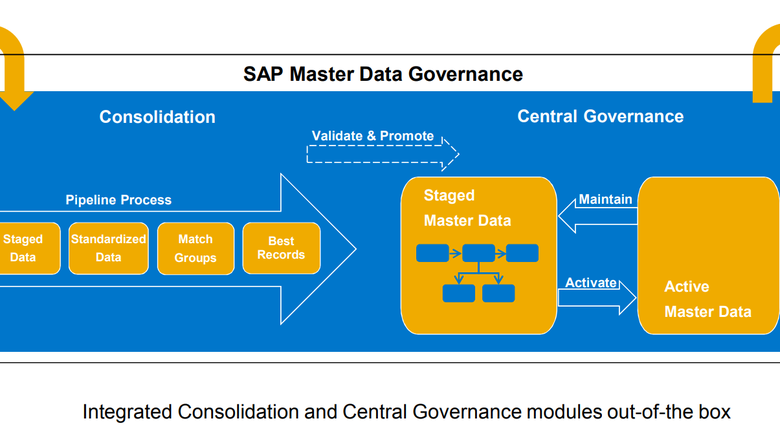Why choose SAP MDG?

SAP MDG (SAP Master Data Governance) consists of applications to monitor master data for business processes. Because every industry has a big problem with redundant and inconsistent master data across multiple systems. SAP MDG provides a framework and tools to ensure master data consistency across all end-to-end business processes.
According to the technology research organization, core data is the coherent, unified set of identifiers and advanced attributes that describe the core business units, such as customers, citizens, prospects, suppliers, locations, hierarchies, and charts of accounts.
Gartner goes on to say that every organization has master data, but the definition of master data and its components is different for each organization. Most organizations end up with no definitions or incomplete definitions of what master data represents within the organization. While there is no generally acceptable example of what benchmark data is, a common definition needs to be used.
SAP Master Data Governance or SAP MDG is a natural extension of the business processes in the SAP Business Suite and provides domain-specific Master Data Governance for the formation, moderation, and mesial distribution of master data.
Why choose MDG?
The main advantage of applying the MDG s is a short implementation cycle. Many of the underlying technical components of the ODMs are model-driven and support a code-free implementation. These technical components such as SAP Business Workflow, ABAP Dictionary, BRFPlus, and WDA FPM have been around for a long time and are also used in various SAP products. They have grown significantly over time and each is a sophisticated solution.
It’s also important to note that the MDG was built on a very stable platform. MDG is a relatively new solution and has grown significantly in recent years. However, implementation on very mature technical components provides a high level of stability in a very short time.
MDG is the SAP product line for master data maintenance. The closest version of NetWeaver MDM has been discontinued and will be phased out. NetWeaver MDM used to be a good product, but that’s a thing of the past. Most professionals who have worked with NetWeaver MDM have found long lead times to be one of the main issues. MDG, on the other side, uses the ABAP stack, has a snippet of the implementation time, and is exceptionally fast compared to its competitors.
The Huge Promise SAP MDG Holds:
MDG holds great promise because master data is critical to every business. The growing importance of data to companies can hardly be overestimated. Even non-technical professionals have recognized the importance of data in companies and how it is used daily to enable companies to achieve new business goals. When it comes to businesses and technicians who understand the operations and specific uses of this data, they become increasingly aware of the importance of data in organizations around the world.
It is well known that any analysis (eg in SAP BI) of such large amounts of business/branch data is only as good as the quality of the master data on which it is represented. The dimensions of these analyzes are and must be exact. The same applies to the efficiency of basic processes (eg in ERP), which are largely dependent on master data values.
Beneficial functions of SAP MDG include:
- Use of existing interfaces and workflows, as well as tested data models
- Verification and tracking of when, why, and by whom master data was changed using version control methods and helps automate the notification process
- Standardize, validate and enrich data by applying, reusing, and integrating existing infrastructure and logic, thus improving its quality
- Deliver broad application and system support by replicating master data as needed across cloud systems and on-premises, then centralizing and consolidating master data from SAP / non-SAP systems to more accurately generate the dataset
- Improve scalability and performance with the SAP HANA in-memory platform.
Benefits of working with MDG for your company:
- More sales by optimizing product data, which will help you identify up-sell and cross-sell opportunities
- Increase efficiency and productivity by centralizing governance of master data activities and workflows
- Minimized procurement costs by integrating material and supplier data across factories, departments, and regions for discounts
- Fast reporting and coordination cycles through validation, integration, and synchronization of master data between on-premises and enterprise systems
- Improves business process efficiency by providing real master data for operating systems
- Simultaneity of master data and use of global attributes to ensure consistency of information
- Cleaning, standardizing, and enriching master data through integration with SAP Data Services
- Improved reporting and analytics through integration with SAP software
- Data governance support through integration with SAP software
- Consolidating master data from heterogeneous sources into a central repository
Job and salary prospects
While it is well known that SAP experts are always in high demand, regardless of industry and economic climate, the job opportunities for SAP MDG experts are enormous as companies compete for the best talent in the industry and provide the best talent in the industry possible wages in the field. Visit for SAP Training in Pune.
When looking for a job in this field, you can choose from a variety of names such as SAP MDG Specialist, Consultant, Specialist Lead, and many other intermediate names.
The average salary for a certified SAP MDG specialist or practitioner was approximately $88,560 as of January 2017 in Los Angeles, California, according to the international job portal Even.com. That’s 6% more than the national average of salaries in the same sector!




